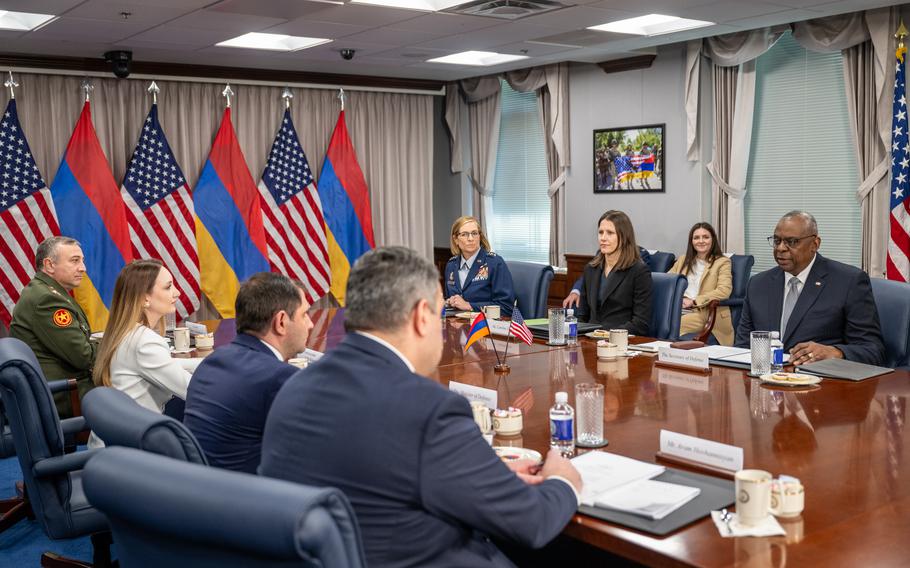
Secretary of Defense Lloyd J. Austin III participates in a bilateral exchange meeting with Armenia Defense Minister Suren Papikyan at the Pentagon, Washington, D.C., Dec. 5, 2024. (Jackie Sanders/Department of Defense )
For four years, President Joe Biden’s foreign policy languished while chaos spread across the globe. Only after November’s defeat did the Biden administration scramble into action in a bid to cement its legacy. Yet in its haste, it rushed through a slew of ill-conceived measures — policies that now threaten, through incompetence rather than design, to hobble swift execution of the Trump agenda.
For President Donald Trump to secure peace between Russia and Ukraine, every ounce of leverage counts. During his Senate confirmation hearing, Trump’s Treasury pick voiced support for tougher sanctions to bring Moscow to the negotiating table and force concessions. The next week, Trump himself confirmed sanctions would be ratcheted up if Russian President Vladimir Putin did not agree to a deal. Sanctions only bite, however, when they’re enforced.
So it strains credulity that, in one of its final acts, the Biden administration signed a Strategic Partnership Commission Charter with a known sanction buster. In January, former Secretary of State Antony Blinken welcomed his Armenian counterpart to Washington to ink the agreement. Streams of coverage have implicated the nation in Russia’s illegal trade, while the U.K.’s Department for Business & Trade published guidance identifying Armenia among several countries where enhanced due diligence is recommended for exporters. Democrats misguidedly believe enhancing partnership with Yerevan will drag it away from its historical dependence on Russia. Instead, it grants permission to continue the path of sanctions busting without consequence.
It is more staggering for the fact that Armenia is a two-way conduit in Russia’s sanction evasions. In one direction, it facilitates the influx of dual-use technologies to Russia, importing then re-exporting goods from the West to fuel Moscow’s arms industry. In the other, it serves as a gateway for embargoed Russian commodities to enter global markets, disguising them with a “product of Armenia” label.
Gold, Russia’s largest non-energy export, was among the first commodities hit with sanctions. Since April 2023, Moscow’s gold exports to much of the world have ground to a halt — except to members of the Eurasian Economic Union (EAEU), Russia’s equivalent of the European Union, of which Armenia is a member. The numbers tell the story: Armenia’s gold exports have surged far above its domestic production capabilities, closely mirroring its increase in Russian gold imports. This is no coincidence; it’s a deliberate workaround. With Armenia imposing no export duties, the country has effectively become a free-trade zone for Russian gold to evade sanctions.
The significance of illicit gold to Russia’s revenue streams became evident last year when the U.K. and U.S. targeted the global trade in illegal gold, citing its role in financing Russia’s war efforts. In December, Britain, in coordination with the U.S., announced the disruption of a global money laundering ring used by rich Russians to evade sanctions. Yet, just a month later, the U.S. is signing partnership agreements with none other than Moscow’s chief gold smuggler.
With Biden out of the White House, America has a chance to change course and regain lost ground. Yet not all policy missteps are easily walked back. On his first day in office, Trump swiftly reversed Biden’s last-minute removal of Cuba from the terrorist list with a stroke of the executive pen. However, sanctions, when enforced effectively, require time to take hold. Despite Biden’s professed support for sanctions, his administration’s incompetence in implementing them has weakened Trump’s hand.
Even in the last few days of his term, Biden issued a raft of new sanctions on Russia’s energy sector. However, with public gestures supporting sanctions evaders, these actions seemed more like symbolic posturing than effective deterrents. Rather than gifting Armenia partnership, the country should face secondary sanctions for its complicity in trading embargoed goods. Now, it is up to Trump to strengthen the sanctions framework and rebuild a position of leverage for future negotiations.
The U.S. should also put pressure on its partners in NATO. The EU boasts of its efforts to weaken Russia. But it harbors similar fantasies about peeling away Moscow’s allies. Last year, the European Union Parliament passed a resolution backing Armenia’s prospective EU membership. Yet despite approving legislation to launch the accession process, Armenian officials have made it clear that they have no intention of leaving the EAEU — the very bloc that has enabled it to become a chief architect in Russian smuggling of gold and sanctions busting.
The path forward is clear: Trump must rebuild a cohesive sanctions regime that targets both Russia and its enablers. Precious time may have been lost, but at least the time of naivete has ended.
Wes Martin, a retired U.S. Army colonel, has served in law enforcement positions around the world and holds a MBA in International Politics and Business.